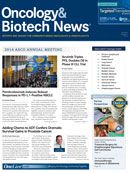Cabozantinib Reduces Tumor Growth After Erlotinib Failure in NSCLC
Cabozantinib added to erlotinib has antitumor activity in heavily pretreated patients with EGFR-positive non–small cell lung cancer (NSCLC) whose disease progressed on erlotinib alone, according to the results of a phase II trial presented at the 2014 ASCO Annual Meeting.
Karen L. Reckamp, MD
Cabozantinib added to erlotinib has antitumor activity in heavily pretreated patients with EGFR-positive non—small cell lung cancer (NSCLC) whose disease progressed on erlotinib alone, according to the results of a phase II trial presented at the 2014 ASCO Annual Meeting. The study demonstrated a significant reduction in the growth rate of tumors in 85% of patients with the addition of cabozantinib, said lead author Karen L. Reckamp, MD, associate professor and co-director of the Lung Cancer and Thoracic Oncology Program at City of Hope in Duarte, California.
Patients with sensitizing EGFR mutations respond well to EGFR-targeted therapy, but following clinical response, they typically experience disease progression and secondary resistance.
T790M in exon 20 of the EGFR gene accounts for about 50% of acquired erlotinib resistance, explained Reckamp. T790M can be accompanied by amplification of the MET proto-oncogene, which promotes acquired EGFR tyrosine kinase inhibitor (TKI) resistance in about 20% of cases. Optimal therapy following progression on EGFR TKIs is not established.
“Cabozantinib is a multitargeted TKI and targets the [VEGF] receptor, MET, RET, AXL, c-KIT, and many others,” Reckamp said. “We’re most interested in the VEGF- and the MET-targeting aspects of the drug in combination with erlotinib in patients with EGFR TKI resistance. Those are potential mechanisms of resistance outside of T790M.”
A prior phase I/II study in which cabozantinib was combined with erlotinib in unselected patients with NSCLC demonstrated a partial response in three patients with prior erlotinib therapy and prolonged stable disease (>9 months) in a patient with T790M mutation, Reckamp noted.
The single-arm study she presented during the ASCO meeting included 37 patients (ECOG performance status of 0 or 1) with known EGFR mutation and progressive disease on erlotinib immediately prior to enrollment. The median number of prior systemic therapies was two; 14 patients had more than two prior systemic therapies and the maximum number of such previous therapies was eight. Twenty-six of the 37 patients had EGFR mutation on exon 19, and 11 had EGFR mutation on exon 21.
After a median of four cycles of treatment and a median follow-up of 5.9 months, two patients had a partial response, one had an unconfirmed partial response, and 22 had stable disease. The disease control rate, defined as partial response and stable disease at 8 weeks and beyond, was 67.6% (25 of 37).
Twenty-two of 26 patients demonstrated significant growth-rate reduction in their tumors, corresponding to a >30% increase in the time to tumor size doubling, using each patient’s tumor growth rate during prior TKI treatment as his/ her own control.
The combination of cabozantinib and erlotinib was generally well tolerated, with grade 2 diarrhea and fatigue being the most common toxicities. Diarrhea was the most common grade 3 adverse event (30%). There were four grade 4 adverse events: vomiting in one patient, an elevated level of lipase in twp patients, and an elevated level of serum amylase in one patient.
“A correlation of outcomes with MET amplification is ongoing,” said Reckamp. “We believe that the combination warrants further clinical investigation in patients with EGFR mutation— positive NSCLC.”
The study was conducted through the California Cancer Consortium and was supported by the National Cancer Institute.
Reference
Reckamp KL, Frankel PH, Mack PC, et al. Phase II trial of XL184 (cabozantinib) plus erlotinib in patients with advanced EGFR-mutant non-small cell lung cancer with progressive disease on epidermal growth factor receptor tyrosine kinase inhibitor therapy: a California Cancer Consortium phase II trial (NCI 9303). J Clin Oncol. 2014;32:5s (suppl; abstr 8014).




